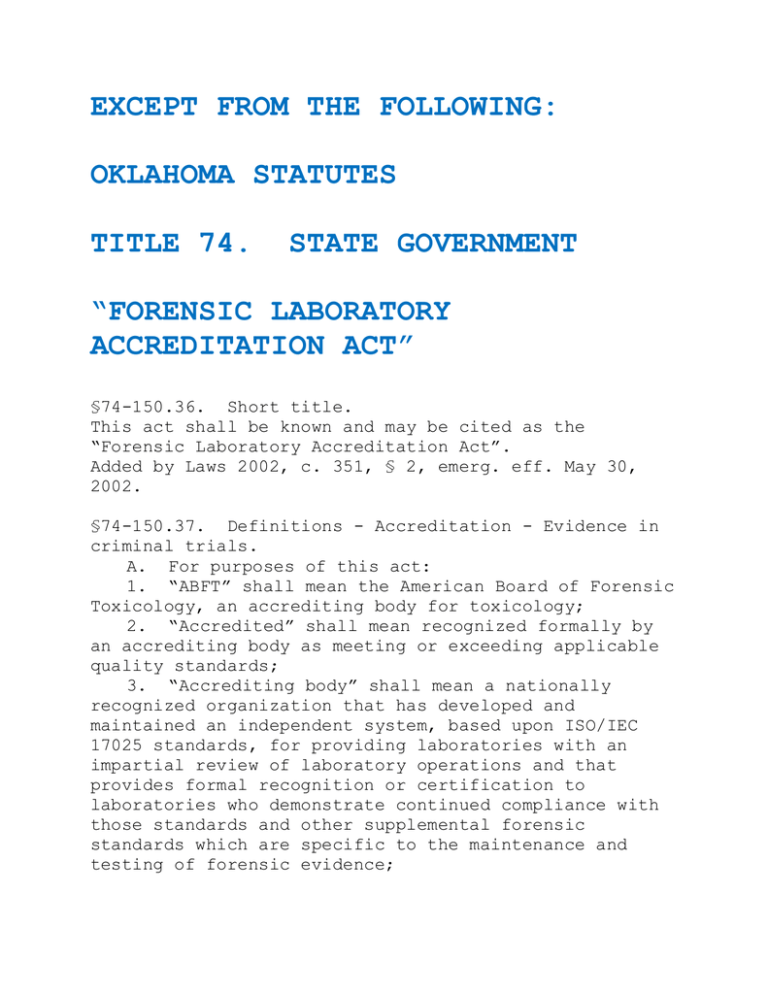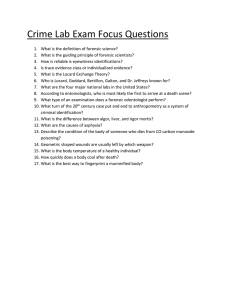
EXCEPT FROM THE FOLLOWING:
OKLAHOMA STATUTES
TITLE 74.
STATE GOVERNMENT
“FORENSIC LABORATORY
ACCREDITATION ACT”
§74-150.36. Short title.
This act shall be known and may be cited as the
“Forensic Laboratory Accreditation Act”.
Added by Laws 2002, c. 351, § 2, emerg. eff. May 30,
2002.
§74-150.37. Definitions - Accreditation - Evidence in
criminal trials.
A. For purposes of this act:
1. “ABFT” shall mean the American Board of Forensic
Toxicology, an accrediting body for toxicology;
2. “Accredited” shall mean recognized formally by
an accrediting body as meeting or exceeding applicable
quality standards;
3. “Accrediting body” shall mean a nationally
recognized organization that has developed and
maintained an independent system, based upon ISO/IEC
17025 standards, for providing laboratories with an
impartial review of laboratory operations and that
provides formal recognition or certification to
laboratories who demonstrate continued compliance with
those standards and other supplemental forensic
standards which are specific to the maintenance and
testing of forensic evidence;
4. “ISO/IEC 17025” shall mean the International
Organization of Standards/International
Electrotechnical Commission standard 17025 that is
published by the International Organization for
Standardization and the International Electrotechnical
Commission and included as a standard in general
requirements for the competence of testing and
calibration laboratories;
5. “Forensic laboratory” shall mean a laboratory
operated by the state or any unit of municipal, county,
city or other local government that examines physical
evidence in criminal matters and provides opinion
testimony in a court of law;
6. “Toxicology analysis” shall mean a laboratory
analysis whereby biological samples are tested for
alcohol and/or other toxic or intoxicating substances;
7. “IAI” shall mean the International Association
for Identification; and
8. “Supplemental forensic standards” shall mean
additional requirements specifically related to
maintenance and analysis of forensic evidence required
in addition to the calibration and testing requirements
of ISO/IEC 17025 standards.
B. Effective July 1, 2005, all forensic
laboratories as defined in this act established or
operating prior to that date shall be accredited. The
following exceptions shall apply:
1. Breath testing for alcohol;
2. Field testing, crime scene processing, crime
scene evidence collection, searches, examinations or
enhancements of digital evidence, and crime scene
reconstruction;
3. Latent print identification performed by an IAI
certified latent print examiner;
4. Marihuana identification using methods generally
accepted in the forensic field that are approved by a
forensic laboratory accredited in controlled
substances;
5. All forensic laboratories established on or
after July 1, 2005, as defined in this act, shall be
accredited within two (2) years of establishment; and
6. Forensic laboratories that exclusively and
solely perform forensic toxicology analysis may meet
this requirement by being either accredited through an
accrediting body as defined in this section or
accredited by ABFT.
C. On or after July 1, 2005, testimony, results,
reports, or evidence of forensics analysis produced on
behalf of the prosecution in a criminal trial shall be
done by an accredited forensic laboratory. This
section shall not apply to:
1. Testimony, results, reports, or evidence of
forensic analysis produced by a forensic laboratory
established after July 1, 2005, and not yet required to
be accredited as set forth in subsection B of this
section;
2. Testimony, results, reports, or evidence of
forensic analysis produced by a forensic laboratory
prior to July 1, 2005. Such testimony, results,
reports, or evidence need not be performed by an
accredited forensic laboratory and may be produced or
presented on behalf of the prosecution in a criminal
trial after July 1, 2005, as long as the forensic
analysis was produced prior to that date;
3. Testimony, results, reports, or evidence of
breath testing for alcohol;
4. Testimony, results, reports, or evidence of
field testing, crime scene processing, crime scene
evidence collection, searches, examinations or
enhancements of digital evidence, and crime scene
reconstruction;
5. Testimony, results, reports, or evidence of
latent print identification performed by an IAI
certified latent print examiner; and
6. Testimony, results, reports, or evidence of
marihuana identification using methods generally
accepted in the forensic field that are approved by a
forensic laboratory accredited in controlled
substances.
Added by Laws 2002, c. 351, § 3, emerg. eff. May 30,
2002. Amended by Laws 2003, c. 203, § 1, emerg. eff.
May 9, 2003; Laws 2011, c. 137, § 2, eff. Nov. 1, 2011.
§74-150.38. Child Abuse Response Team (CART) Employees - Qualifications - Report.
A. Subject to the availability of funds, there is
hereby established within the Oklahoma State Bureau of
Investigation the Child Abuse Response Team (CART) for
the purpose of investigating cases of physical and
sexual abuse of a child. For the purpose of
implementing CART, the Bureau shall employ at least
eight Law Enforcement Special Agents assigned to the
CART, which shall be full-time-equivalent positions
within the Bureau. The previously unclassified
positions of CART investigator and CART forensic
interviewer shall be transferred to and placed in the
classified service without a loss in salary.
B. In addition to any other law or rule specifying
requirements or qualifications for an OSBI agent to be
employed by the Bureau, the Child Abuse Response Team
employees shall be qualified for the respective
positions as follows:
1. Every CART Agent shall:
a. have at least three (3) years of experience
as a criminal investigator in a law
enforcement agency or agencies,
b. be currently certified as a peace officer
by the Council on Law Enforcement Education
and Training (CLEET),
c. have served as the primary criminal
investigative officer in a law enforcement
agency or agencies on cases of physical or
sexual abuse of a child,
d. have graduated from an accredited college
or university with a bachelor degree,
e.
have experience in conducting forensic
interviews of children in cases of physical
or sexual abuse of a child,
f. have experience testifying in cases of
physical or sexual abuse of a child, and
g. have completed at least one hundred (100)
hours of education or training on forensic
interviewing of a child.
2. If the director of the Oklahoma State Bureau of
Investigation is unable to find a person whose
qualifications meet or exceed the qualifications
specified for the position of Law Enforcement Special
Agent assigned to the CART, the director is authorized
to offer such position to a person whose qualifications
substantially meet the qualifications specified for the
position.
C. The Bureau may promulgate rules, procedures and
forms necessary to establish and implement the
functions of the Child Abuse Response Team and to
coordinate responsibilities with other persons or
agencies having responsibilities relating to child
abuse investigation and response to child abuse.
Members of the Child Abuse Response Team are
authorized, when available, to be involved and utilized
in investigations of crimes other than cases of
physical and sexual abuse of a child.
D. On or before July 1, 2015, the Bureau shall
submit to the Governor, President Pro Tempore of the
Senate, and Speaker of the House of Representatives a
statistical report regarding the activities of the
CART.
Added by Laws 2006, c. 326, § 2, eff. July 1, 2006.
Amended by Laws 2012, c. 153, § 3, eff. Nov. 1, 2012;
Laws 2014, c. 406, § 1, emerg. eff. June 3, 2014.


